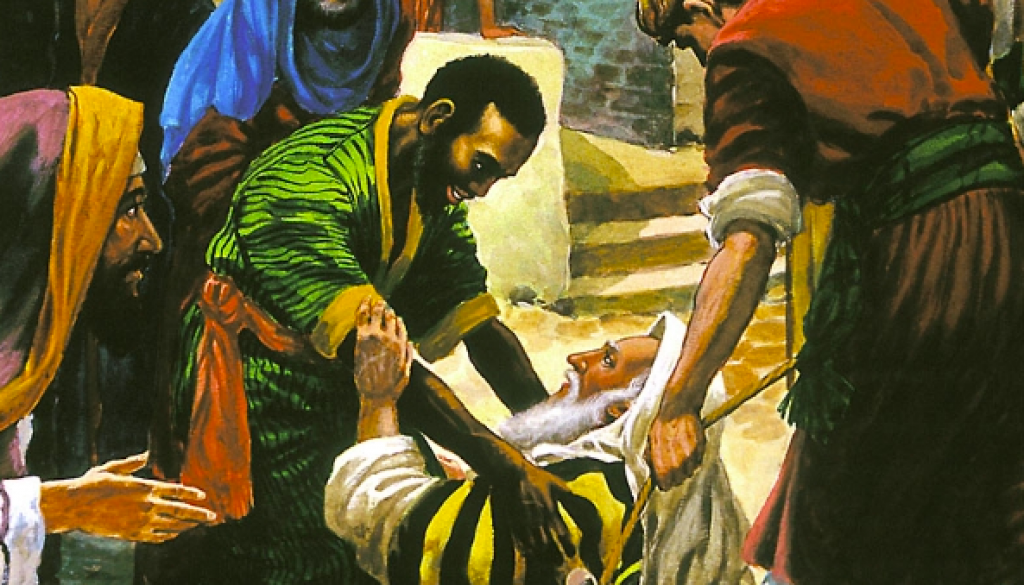Servant Leadership Personified
I’m always looking for examples of servant leadership personified… and am excited when I discover the personification in unexpected places.
Clearly, the Bible is a place where I anticipate finding great servant leaders… Jesus, Moses, Paul – to name a few of the prominent go-to people. But I have just been reading the book of Jeremiah and stumbled across an African servant leader who occupies just a handful of verses… but highlights so many qualities of what it means to grab a towel and put other people first.
Intrigued… then read on.
Jeremiah is the kind of guy who wore his heart on his sleeve – and his book oscilates between incredible prophetic proclamations, and intimate details of his life and relationship with God. He had a lot to process. Due to the unpopularity of his message, he was rejected and ridiculed by the religious elite, ostracised by the majority of his own people, and physically persecuted because he refused to compromise on his message.
I’ve read the book of Jeremiah numerous times, and I love how his divine utterances are juxtaposed with his own faith struggles and life challenges – all set against the backdrop of national catastrophe. God had pronounced through Jeremiah (and numerous other Old Testament prophets) that judgement was coming upon Judah at the hands of the Babylonians. The Jews could have chosen to repent from their idolatrous practices and seek the Lord. Instead, they chose to make various alliances in order to try and resist the Babylonian juggernaut.
At the climax of the story, Jerusalem is under siege. In an act of despotic defiance, the leaders of the city persuaded the king to allow them to seize Jeremiah and confine him to a prison – which in this case was an unsanitised cistern in someone’s back yard. The situation looked perilous for Jeremiah… literally stuck in the mud, without food and water, no doubt composing his lamentations (desperate cries) to the Lord for justice (see Lamentations 3:52-66).
This is the background to introduce a bible character whose exploits I’d never previously noticed. An unsung hero who personifies “grab-a-towel” style of servant leadership.
His name was Ebed-Melech. He wasn’t a Jew. He was a Cushite – originally from North-East Africa (some translations say he was an Ethiopian). He was an official in the royal court. His name means Servant/Slave of the King. We don’t know how he came to be there, yet in God’s providence, he was the right man, in the right place, at the right time, with the right heart. He was a man with a different spirit; a man willing to stand against the crowd and follow his conscience in order that justice could prevail. He makes his curtain-call in Jeremiah 38:7. In the next six verses, Ebed-Melech self-sacrificial actions result in Jeremiah being released from the stinky well and returned to the palace court to once more plead the Lord’s case to King Zedekiah (who once more proved too stubborn to listen).
In this short explosion into the biblical narrative, Ebed-Melech demonstrates some incredible qualities of servant leadership, which are starkly contrasted to the other leaders in Jerusalem at the time:
-
Compassion: Genuine compassion is not simply feeling sorry for someone, but causes one to take action. When Ebed-Melech heard about Jeremiah’s plight he couldn’t stand by and allow an innocent person to die! His conscience provoked him to act.
-
Advocacy: Servant leaders speak up on behalf of the vulnerable… for those who are not being heard. Ebed-Melech became Jeremiah’s advocate. He could not stand by and allow an unjust act to take place – so went to the king to plead for Jeremiah’s life.
-
Courage: Whenever I observe a servant leader in action, I’m always struck by the co-existence of humility and courage. Humble people are incredibly courageous… ready to risk their own reputations and even their own lives, in order to serve others. Ebed-Melech had the courage of his convictions to go against the flow and stick his neck out in order to help the prophet of God.
-
Influence: remarkably,the king listened. I would have loved to have been a fly on the wall and I have so many questions about the back story on the relationship between the king, Jeremiah and Ebed-Melek. But what I discern is that Ebed-Melech’s level of integrity enabled him to influence the decision of the king and see an evil act overturned (not unlike Esther who would exert similar influence a century later). Not only that, the king even provided Ebed-Melek with 30 men to help him save Jeremiah and protect him from reprisals. Servant leaders gain influence through the consistency of their godly character.
-
Humility. Just as quickly as he came on the scene, Ebed-Melech is ushered off the stage. He makes no demands of Jeremiah, seemingly expecting nothing in return. He is satisfied to have served God and followed his conscience. His humility is striking and he had the peace to know that he had done his duty.
However, this is not the conclusion of the story. In the following chapter, just as Jerusalem is about to be finally conquered, Jeremiah sends a reassuring word to Ebed-Melech. God had seen his actions and promises him salvation from the pending disaster (see Jeremiah 39:15-18). The story of Ebed-Melech, therefore, not only personifies servant leadership, but also beautifully demonstrates the impartial saving mercy of God. When the Jews were being punished for their faithlessness, an Ethiopian eunuch is being rescued because he had personified righteous faith in action.
This is the kind of servant leadership the world desperately needs to see. Author and evangelist, Nick Vujcic writes:
To simply say ‘I believe’ in something is not enough. If you want to have an impact in this world, you must put your beliefs and your faith into action… When you put faith into action to sow good seeds by serving others, you tap into a power beyond anything you can imagine. (from Unstoppable: the incredile power of faith in action)
I hope the example of Ebed-Melech will encourage you to grab a towel and show compassionate servant leadership within your context. Let’s put faith in action and self-sacrificially follow Christ through serving others.





August 4, 2020 @ 9:06 am
Great blog Tim. Very inspiring and opens our heart to go deeper into Gods word. These simple but deep nuggets of truth is so relevant for us today as we seek to reach people for His glory. Blessings